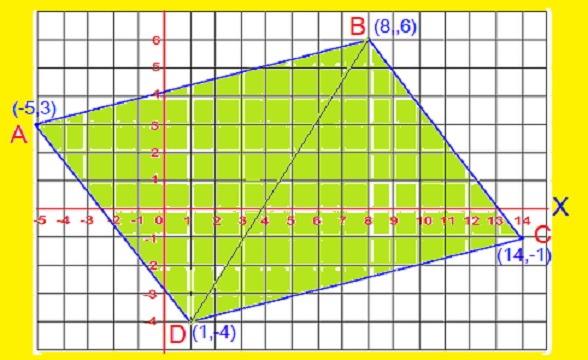We know that ,
#"If "P(x_1,y_1) ,Q(x_2,y_2),R(x_3,y_3)# are the vertices of
#triangle PQR#, then area of triangle:
#Delta=1/2||D||,# where , #D=|(x_1,y_1,1) ,(x_2,y_2,1),(x_3,y_3,1)|#........................#(1)#
Plot the graph as shown below.
Consider the points in order, as shown in the graph.

Let #A(-5,3) ,B(8,6) ,C(14,-1) and D(1,-4)# be the vertices of Parallelogram #ABCD#.
We know that ,
#"Each diagonal of a parallelogram separates parallelogram"#
#"into congruent triangles."#
Let #bar(BD)# be the diagonal.
So, #triangleABD~=triangleBDC#
#:. "Area of parallelogram "ABCD=2xx "area of"triangleABD "#
Using #(1)#,we get
#Delta=1/2||D|| ,where, # #D=|(-5,3,1),(8,6,1),(1,-4,1)|#
Expanding we get
#:.D=-5(6+4)-3(8-1)+1(-32-6)#
#:.D=-50-21-38=-109#
#:.Delta=1/2||-109||=109/2#
#:.Delta=54.5#
#:. "Area of parallelogram "ABCD=2xx "area of"triangleABD "#
#:. "Area of parallelogram "ABCD=2xx(109/2)=109#
#:. "Area of parallelogram "ABCD=109 " sq. units"#


